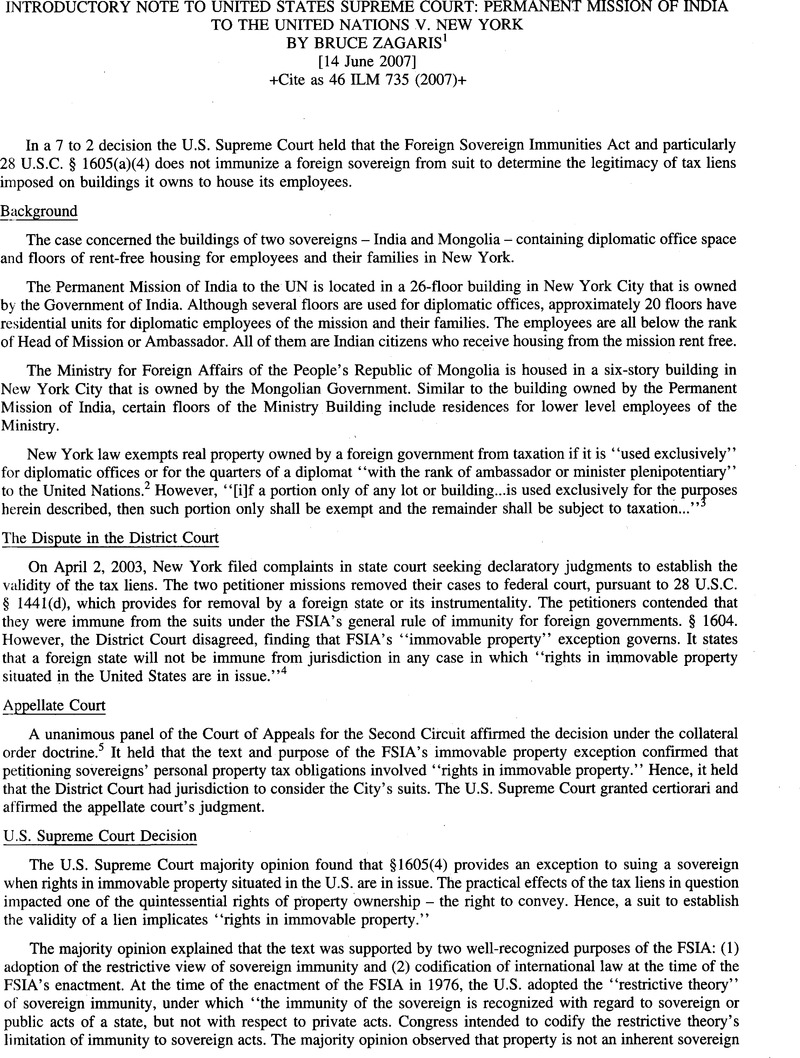No CrossRef data available.
Article contents
United States Supreme Court: Permanent Mission of India to the United Nations v. New York
Published online by Cambridge University Press: 27 February 2017
Abstract

- Type
- Judicial and Similar Proceedings
- Information
- Copyright
- Copyright © American Society of International Law 2007
Footnotes
This text was reproduced and reformatted from the text appearing at the United States Supreme Court website (visited July 23, 2007). <http://www.supremecourtus.gov/opinions/06pdf/06-134.pdf >
References
1 Partner, Berliner Corcoran&Rowe LLP, Washington, D.C. and member of the ILM Advisory Board.
2 N.Y. Real Prop. Tax Law Ann. § 418 (West 2000).
3 Id.
4 §1605(a)(4).
5 Permanent Mission of India to the United Nations v. New York, 446 F.3d 365 (2006).
6 The other countries challenging and not paying the fees are Equatorial Guinea, Egypt, Germany, Libya, Mauritius, Rwanda, Saudi Arabia, South Africa, and Switzerland. See US diplomats in London roads row, BBC News, Oct. 20, 2005.
7 Id.
8 See, e.g., Associated Press, Supreme Court Justices Spar Over International Law, <http://www.law.com,> January 18, 2005; U.S. Supreme Court Holds Juvenile Death Penalty Unconstitutional, Citing Treaties and Foreign Practice, 99 A.J.I.L. 487-488 (Apr., 2005).
9 For background on the negotiation of the Mexico-U.S. TIEA, see Bruce Zagaris, Mexican Senate Ratifies Tax Information Exchange Agreement (TIEA), 6 International Enforcement L. Rep. 7 (January 1990). Bruce Zagaris, U.S.-Mexico TIEA In Force, 6 International Enforcement Law Rep. 65 (February 1990).
* This text was reproduced and reformatted from the text appearing at the United States Supreme Court website (visited July 23, 2007).http://www.supremecourtus.gov/opinions/06pdf/06-134.pdf>
1 The City concedes that even if a court of competent jurisdiction declares the liens valid, petitioners are immune from foreclosure proceedings. See Brief for Respondent 40 (noting that there is no FSIA immunity exception for enforcement actions). The City claims, however, that the declarations of validity are necessary for three reasons. First, once a court has declared property tax liens valid, foreign sovereigns traditionally concede and pay. Second, if the foreign sovereign fails to pay in the face of a valid court judgment, that country's foreign aid may be reduced by the United States by 110 of the outstanding debt. See Foreign Operations, Export Financing, and Related Programs Appropriations Act, 2006, §543(a), 119 Stat. 2214 (hereinafter Foreign Operations); Consolidated Appropriations Act of 2005, §543(a), 118 Stat. 3011 (hereinafter Consolidated Appropriations). Third, the liens would be enforceable against subsequent purchasers. 5 Restatement of Property §540 (1944).
2 The City offers several other arguments against immunity based on the Vienna Convention, but those arguments ulti mately go to the merits of the case, i.e., whether petitioners are actually responsible for paying the taxes. Because the only question before us is one of jurisdiction, and because the text and historical context of the FSIA demonstrate that petitioners are not immune from the City's suits, we leave these merits-related arguments to the lower courts.




